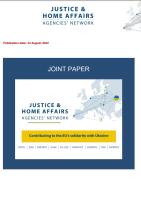Judicial Cooperation Key documents
23 August 2022|AVAILABLE IN ENGLISH
Russia’s unprovoked and unjustified military aggression against Ukraine, which started on 24 February 2022, triggered a firm and overarching political response by the European Union. Actions in the justice and home affairs policy field are integral parts of this response, with a paramount importance...
27 July 2022|LAST UPDATE:23 January 2024|AVAILABLE IN ENGLISH
The Second Additional Protocol to the Council of Europe Convention on Cybercrime (Budapest Convention) on enhanced co-operation and disclosure of electronic evidence (Protocol) aims to further enhance cooperation on cybercrime and the ability of criminal justice authorities to collect electronic...
22 July 2022|AVAILABLE IN ENGLISH
The advent of Artificial lntelligence (Al) holds great potential to improve criminal justice cooperation, both at home and across borders. The field of justice is undergoing digital transformation, and AI, as a set of different technologies, has an important role to play in helping judicial...
13 July 2022|LAST UPDATE:23 January 2024|AVAILABLE IN ENGLISH
The Council of Europe Convention on Cybercrime (Budapest Convention) was the first international treaty to focus explicitly on cybercrime. Its aim is to function as an international framework for the harmonization of cybercrime-related legislation and to facilitate the fight against criminal...
29 June 2022|AVAILABLE IN ENGLISH
In a landmark judgement on 13 January 2022, the German Higher Regional Court of Koblenz sentenced a former high-ranking Syrian official to life imprisonment for his involvement in crimes against humanity. In 2021, an associate of the high-ranking official was sentenced by the same court to four and...
21 June 2022|AVAILABLE IN ENGLISH
The complexity of cross-border cases makes it especially difficult for judicial authorities to protect victims’ rights. Involving Eurojust early in the process helps to overcome these difficulties and ensure victims’ protection. This leaflet explains the challenges involved in safeguarding victims’...
17 June 2022|AVAILABLE IN ENGLISH
Checklist for Practitioners on Joint Investigation Teams Involving Third Countries Read the Checklist These guidelines, jointly prepared by the JITs Network Secretariat and Eurojust, provide guidance to EU Member State practitioners on setting up a Joint Investigation Team (JIT) with a third country...
17 June 2022|AVAILABLE IN 24 LANGUAGES
Guidelines on Joint Investigation Teams Involving Third Countries Read the Guidelines This checklist covers all issues practitioners need to consider when setting up a JIT with a third country. The checklist addresses all relevant issues for consideration from the set-up phase to the operational and...
23 May 2022|AVAILABLE IN ENGLISH
This factsheet outlines the key factors for successful investigations and prosecutions of genocide, crimes against humanity and war crimes within the EU. It is essential for Member States to adopt a complete legislative framework defining core international crimes into national law. To build...
23 May 2022|AVAILABLE IN 24 LANGUAGES
Using observations collected by the Genocide Network Secretariat from Genocide Network Member and Observer States, this report engages in a stocktaking exercise. Looking back at recommendations listed in the 2014 Strategy of the Genocide Network to combat impunity for genocide, crimes against...










